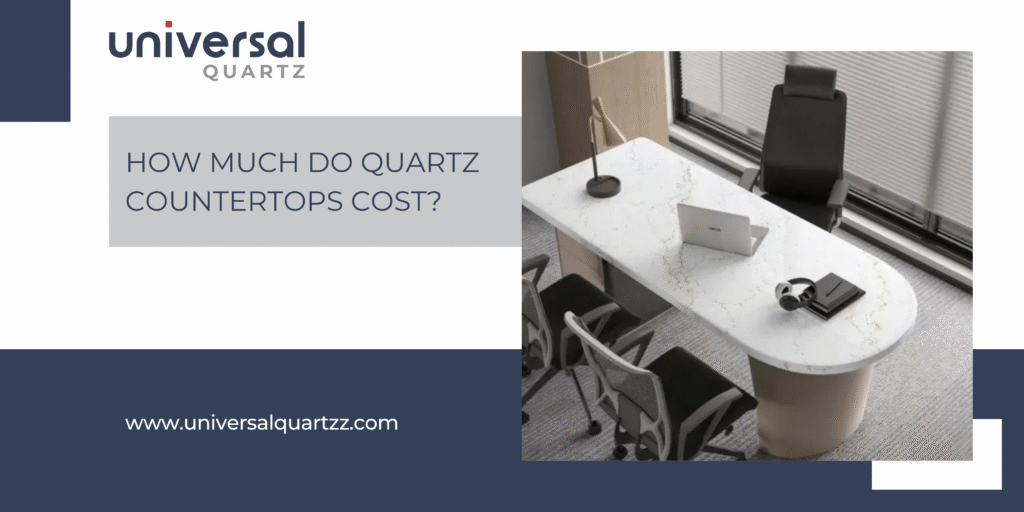Quartz countertops have become one of the most popular choices for homeowners and designers seeking a durable, stylish, and low-maintenance surface. Whether you’re remodeling your kitchen, upgrading your bathroom, or designing a brand-new space, quartz is a fantastic investment. But one of the most common questions we hear at Universal Quartz is: “How much do quartz countertops cost?” The answer depends on several factors, including material quality, customization, and installation. Let’s explore what influences quartz countertop pricing and how you can make the best choice for your budget and style.
Quartz Countertop Cost vs. Other Materials
How does quartz compare with other countertop materials? Let’s break it down:
- Granite countertops cost approximately $40 to $100 per square foot installed. While similarly priced to quartz, granite requires regular sealing and maintenance as a natural stone.
- Marble countertops generally run $65 to $105 per square foot. Though marble offers timeless elegance, it’s more prone to etching and staining than quartz.
- Laminate countertops provide a budget-friendly option at $20 to $50 per square foot. Though much less expensive, they lack the durability and aesthetic appeal of engineered stone like quartz.
For a direct cost per square foot comparison:
| Material | Price Range (per sq ft installed) |
| Quartz | $50-$120 |
| Granite | $40-$100 |
| Marble | $65-$105 |
| Laminate | $20-$50 |
Factors That Affect Quartz Countertops Cost
Several key factors influence how much you’ll pay for quartz countertops:
Quality and Brand of Quartz
Quartz quality varies significantly between manufacturers. Premium brands like Universal Quartz cost more, but offer superior durability and unique patterns that less expensive options can’t match.
Higher-quality quartz often features:
- More consistent coloring
- Better resistance to chips and scratches
- More unique patterns and designs
- Stronger warranties
Countertop Thickness
Quartz countertops come in different thicknesses, with standard options being 2cm (¾ inch) and 3cm (1¼ inch). Thicker slabs cost more but provide additional durability. For busy kitchens, thicker slabs can be worth the investment.
Many homeowners choose 3cm thickness for kitchen counters, while bathroom vanities often use 2cm slabs. Some ultra-luxury designs feature jumbo slabs or thicker options for a bold statement.
Countertop Edges
The edge profile you select affects installation costs. Simple, straight edges are most affordable, while more elaborate options like bullnose, half bullnose, ogee, or slightly rounded edges add to the price.
Complex edge treatments require more labor and specialized equipment, increasing your total cost. A basic eased edge might add nothing to your quote, while an intricate waterfall edge could add $1,000 or more.
Color and Design Complexity
Quartz countertop colors and patterns range from simple, consistent designs to complex options that mimic natural stone. Darker quartz countertops with unique patterns or veining similar to marble typically cost more due to the manufacturing process.
Solid colors and simple patterns usually fall at the lower end of the price spectrum, while exotic designs with multiple colors or elaborate veining command premium prices.
Installation Complexity
The installation process significantly impacts your final cost. Factors that can increase installation costs include:
- Awkward angles or curves
- Multiple seams
- Cutouts for sinks, faucets, or appliances
- Kitchen islands requiring special supports
- Matching quartz backsplash installation
- Removal of old countertops
Simple, rectangular countertops with minimal cutouts will cost less to install than complex layouts with multiple sections or special features.
Square Footage
Unsurprisingly, larger countertops cost more simply because they require more material. Square footage is calculated based on the total surface area, including any overhangs or vertical surfaces in waterfall edges.
Kitchen islands can significantly increase your total square footage, so consider this in your budget planning. Most fabricators have minimum charges regardless of size, so very small projects might still have a substantial per-square-foot cost.
Conclusion: Is Quartz Worth the Cost?
In conclusion, quartz countertops in the USA represent a significant investment, but one that offers considerable long-term value. From their durability and low maintenance to their design versatility and ability to enhance home value, quartz countertops provide a range of benefits that justify their cost. Whether you’re remodeling your kitchen or bathroom, the quality and beauty of quartz make it a smart choice for homeowners looking to combine functionality with style. Universal Quartz is here to help you navigate the options and ensure that your investment in quartz countertops is one that you’ll enjoy for many years to come.


